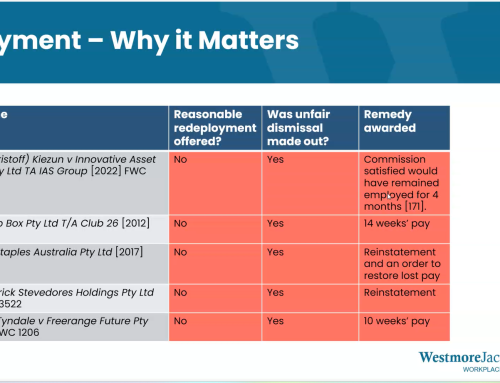
Introduction
“Since our employees are on annual salaries well above award rates, we don’t need to worry about underpayments.”
This commonly held view amongst employers and HR professionals is now in tatters following the landmark Federal Court decision in Fair Work Ombudsman v Woolworths Group Limited & Ors [2025] FCA 1092 (Decision).
Employers, including Coles and Woolworths, have often relied upon carefully drafted set-off clauses to discharge certain award entitlements (such as overtime and penalty rates) by paying above-award salaries to employees.
The Federal Court has now significantly limited the effectiveness of set-off clauses.
In short, any above-award salary payments set-off against award entitlements must occur within the same pay period. It is not possible to reconcile an employee’s award entitlements averaged across several months.
This article explores the significance of set-off clauses, analyses the implications of the Decision, and discusses next steps employers may consider to manage legal risk.
Employers must remain conscious of the high-stakes nature of underpayments, including the possibility of a class action proceeding, harsh civil penalties, and in some instances – the possibility of criminal convictions.
Set-off clauses
It is common practice for employers (of award covered employees) to pay a higher annual salary than the base rate of pay stipulated in the award in order to absorb any additional award entitlements that may be owed to the employee.
This is often considered advantageous to both parties. Employees receive a consistent and reliable income flow and employers are saved the administrative burden of calculating paying penalty and overtime rates for each pay period.[1]
Such an arrangement is often included in a set-off provision contained in employees’ contracts. The set-off clause broadly says that all remuneration paid to an employee can be set-off against award entitlements such as overtime, penalties, allowances and loadings (including annual leave loading).
Prior to the recent Federal Court decision, there was a lack of authoritative guidance on whether entitlements could be set-off across multiple pay-periods.[2] Therefore, many employers, including Woolworths and Coles, had chosen to set-off employee entitlements across several months, a practice which has now landed them in considerable trouble.
The Woolworths and Coles decision
The Decision was an amalgamation of 4 separate proceedings against Woolworths and Coles that were heard together.[3] The proceedings broadly related to an admitted underpayment of entitlements for thousands of salaried managers, who were covered by the General Retail Industry Award 2010 (GRIA).
Woolworths and Coles had been relying upon the set-off clauses within their employment contracts and any above-award salary payments to discharge additional entitlements which arose across several months. By doing so, Woolworths and Coles were attempting to pool any over-award payments made (or anticipated to be made) during quieter periods, and subsequently using that pool to satisfy any obligations arising under the GRIA at a later date.[4]
At the crux of this lengthy decision, Perram J characterised the pooling of payments as an “accounting abstraction,” which can be distinguished from the GRIA requirements to “pay” the amounts which are due.[5] As a result, the set-off clauses failed to attribute an actual payment which would discharge the obligation to pay the entitlements.[6]
This decision provides authoritative guidance that even carefully drafted set-off clauses are to be confined to setting off entitlements which arise from a singular pay-period only. In other words, overpayments from one pay period cannot be used to offset or reduce underpayments from another pay period.
It remains unclear whether Coles or Woolworths will appeal this decision.
What can employers do?
Many employers will need to carefully assess their exposure to legal risks associated with potential wage underpayments. Our tips include the following:
- Evaluate recording keeping procedures for all employees, particularly those covered by an award or enterprise agreement. Records should accurately capture the hours that each employee has actually worked;
- Obtain early legal advice about any potential underpayments. An early admission and quick remediation of underpayments can save an employer from harsh penalties;
- Review set-off clauses used within current employment contracts. As the law currently stands, it is likely that these clauses will be read down to only operate within single pay-periods only;
- Consider other mechanisms to achieve compliance. Options may include carefully drafted individual flexibility agreements, annualised wage arrangements under the award or guarantees of annual earnings; and
- Don’t solely rely on contractual set-off clauses in an employee’s contract unless you are extremely confident there will be no underpayments whatsoever within each and all pay periods.
Adam Colquhoun (Principal) and Baldeep Singh (Law Clerk)
This article is general information only. It is not legal advice. If you need legal advice, please contact us.
Citations:
[1] This has become increasingly difficult for employers to manage during the rise of WFH arrangements. Employers have been able to exercise less control over the hours worked by employees during such arrangements.
[2] Fair Work Ombudsman v Woolworths Group Limited; Fair Work Ombudsman v Coles Supermarkets Australia Pty Ltd; Baker v Woolworths Group Limited; Pabalan v Coles Supermarkets Australia Pty Ltd [2025] FCA 1092 [68]. Cf: Lynch v Buckley Sawmills Pty Ltd (1984) 3 FCR 503.
[3] Two proceedings were initiated by the Fair Work Ombudsman, and two proceedings were initiated as a class action against Coles and Woolworths respectively.
[4] Fair Work Ombudsman v Woolworths Group Limited; Fair Work Ombudsman v Coles Supermarkets Australia Pty Ltd; Baker v Woolworths Group Limited; Pabalan v Coles Supermarkets Australia Pty Ltd [2025] FCA 1092 [59].
[5] Ibid [61, 85-86].
[6] Ibid [62-63]. The clauses were then read down to be attributable to singular pay periods.





